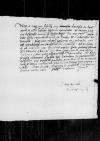Letter #103
Remaclus [ARDUENNA] to Ioannes DANTISCUSMechelen, [1523]-06-11
Manuscript sources:
| ||||||
Text & apparatus & commentary Plain text Text & commentary Text & apparatus Excerpts concerning Dantiscus' travels
Magnifico generosoque viro, domino
Neque te, neque me fefelli, mi Dantisce Dantisce, si locum apud te ullum habeat legitima excusatio, et tamen scio me disperisse animumque despondisse, ita me totum hosce dies stilis conscribillarunt et
Vale.
Tuus probably
Tuus ex animo


 BCz, 1599, p. 1174
BCz, 1599, p. 1174